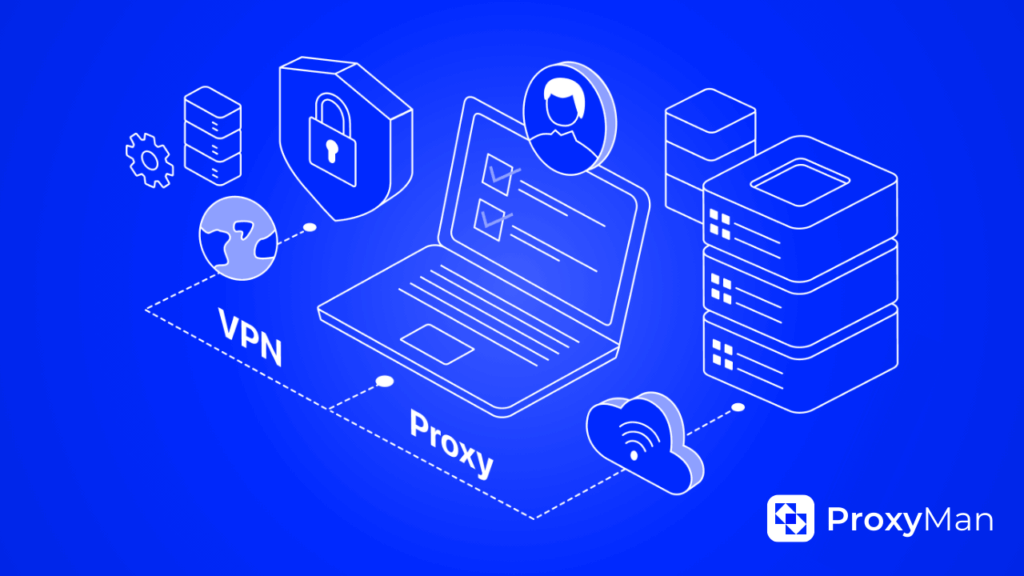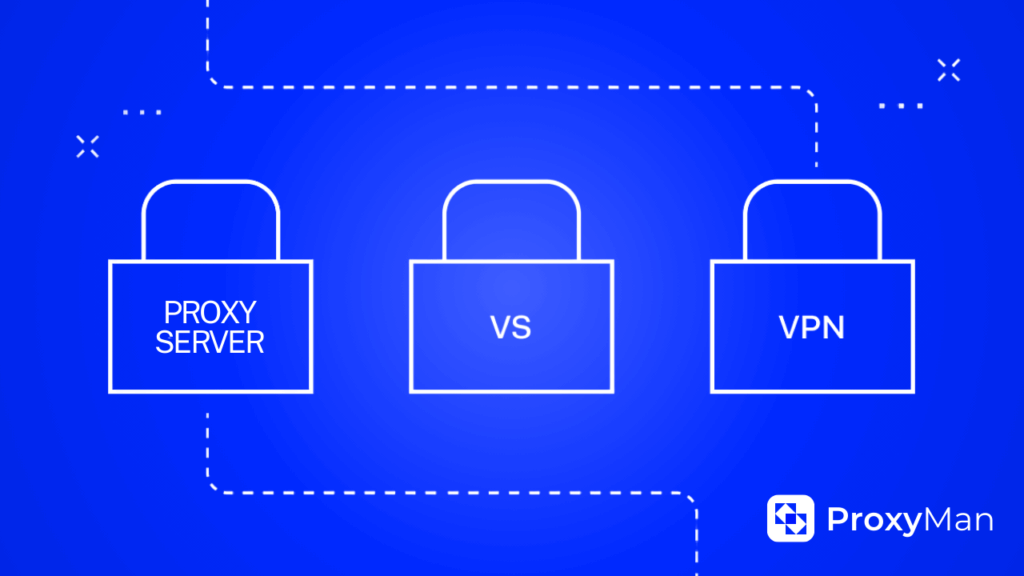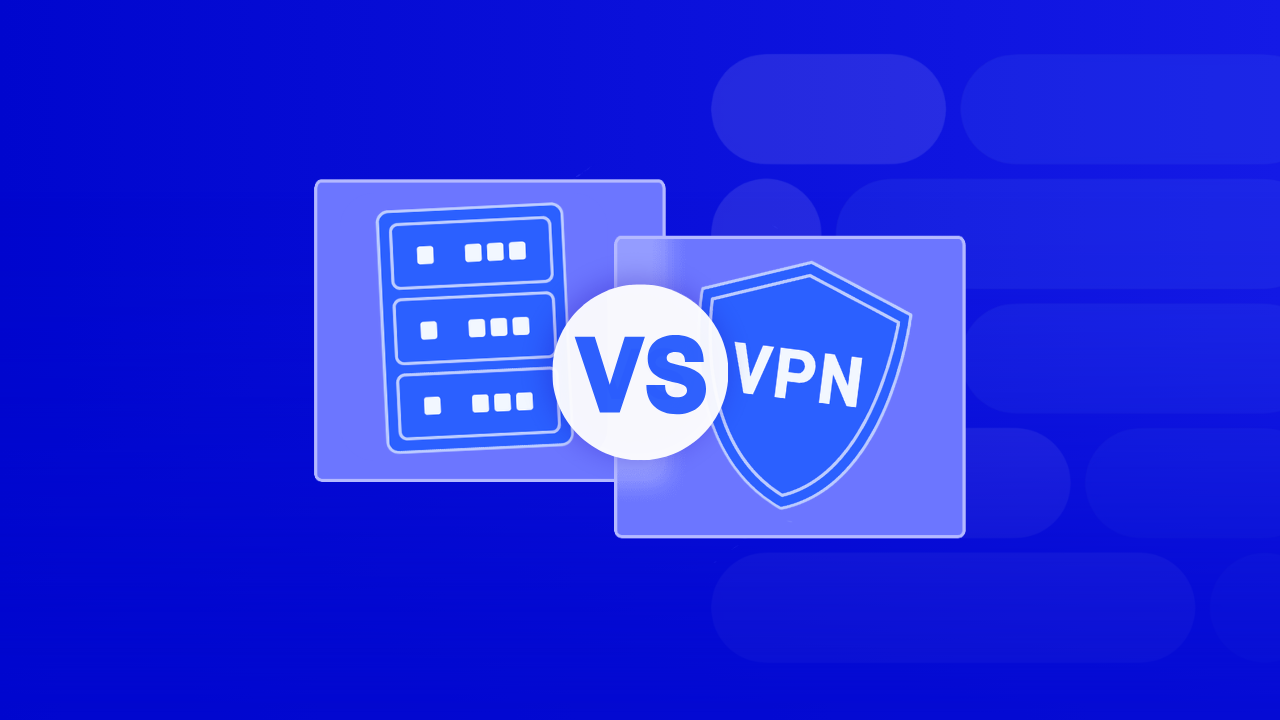Proxy servers and VPNs increase privacy and security, but they have different features and functions. In this article, we will look at the main differences between proxy vs vpn, and help you determine which option is best for your needs.
Related: “How to Unblock Websites without VPN: 5 Effective Alternatives“

What is a VPN
Virtual Private Network (VPN) is a secure tunnel that encrypts a user’s Internet traffic, ensuring privacy and anonymity. By routing traffic through virtual private network servers that are located in different parts of the world, the VPN service masks the user’s IP address and encrypts all data transmitted over the Internet.
There are different types of VPNs. Each is used for specific tasks:
- A remote access VPN is suitable for users who need to securely connect to a private network from a remote location. A VPN client installed on the user’s device is usually used to create an encrypted connection to a corporate network.
- Site-to-Site VPNs are used to establish secure connections between two or more geographically remote networks. Such a VPN connects networks rather than individual devices.
- Mobile VPNs provide permanent encryption of users’ Internet traffic, regardless of the network they use.
- SSL/TLS VPNs use HTTPS web protocols to create secure connections between a user’s device and the VPN gateway.
- IPsec VPN operates at the network layer of the OSI model. It is used in two configurations: remote access or site-to-site.
- Peer-to-peer (P2P) VPNs are based on a decentralized network in which users share their bandwidth and resources to create VPN connections.
What are Proxies?
A proxy acts as an intermediary between the Internet and the user’s device. When a user requests a web page or Internet resource, the proxy transmits the request on the user’s behalf, masking the original IP address. The redirecting server provides anonymity, caches content, and controls access to certain websites.
So, a proxy server allows you to:
- enhance online privacy and create an additional layer of security;
- provide anonymity for research and web scraping;
- balance load and provide content filtering;
- simulate different network conditions and geolocations, e.g. for testing sites.
In this way, proxy servers mask IP addresses and allow users to circumvent content and monitoring restrictions. For example, users can view content with geographic restrictions: a Netflix subscriber from the UK connecting to a proxy server in the US can access Netflix content for the US.
Key Difference Between Proxy and VPN
So, the difference between proxy and VPN lies in several parameters:
- Encryption. VPNs encrypt all Internet traffic, protecting it from possible eavesdropping. Proxies do not have encryption by default.
- IP address masking. VPNs and proxies can mask a user’s IP address, but a VPN guarantees more complete IP address protection by encrypting all Internet activity.
- Traffic control. Proxies allow you to selectively control internet access by filtering or blocking certain websites or content. VPN services don’t involve this level of control and give you secure access to the entire internet.
- Device Protection. VPNs guarantee the security and privacy of all apps and services on your device. Proxies only affect apps configured to use them.

VPN vs Proxy Server: Why You Should Use a Proxy
If you have a question whether to use a proxy or VPN, you need to understand for what purposes you plan to use them. For example, both a proxy server and a VPN can be used to hide an IP address. If you care about browsing speed and need to hide IP addresses from only one site or application, a proxy server will cope with this task better.
On the other hand, for hiding online activities, it is better to connect to it via a VPN, because VPNs encrypt data while browsing the Internet, while proxy servers do not. As a result, VPN provides more security when performing activities such as online banking or online shopping.
At the same time, if we compare vpn vs proxy server, using a proxy still has a number of undeniable advantages:
- Caching. Using a proxy allows you to speed up the loading of resources by saving copies of data that are frequently used.
- Load balancing. Proxies distribute incoming requests among several servers, which increases data processing speed and improves site availability.
- Bandwidth control. Some proxies allow you to limit the speed of your Internet connection to individual users or applications.
- Ease of use. Unlike VPNs, proxies usually do not require the installation of additional software. So for a beginner, the choice of proxies vs vpn is obviously proxies.
FAQ
Q: Which is better: VPN or proxy server?
A: The choice depends on your needs. Proxies improve network performance by caching frequently used content. A VPN simply provides comprehensive security and privacy by encrypting Internet traffic and routing it through a secure server.
Q: Can I use a VPN and a proxy at the same time?
A: Yes, you can use a VPN and a proxy at the same time. But it can complicate things and cause potential performance issues. Both services introduce an extra layer of network routing and encryption, which affects latency and connection speed.
Q: Do I need a VPN and a proxy server at the same time?
A: In most cases, you can get by with one service. However, sometimes the combination of both tools creates an additional level of security and extends functionality.
Q: Can I use a free proxy and VPN?
A: You can, but it is better to use reputable services with a high level of security. Free services are sometimes dangerous, as the provider’s intentions and security level can be uncertain.



